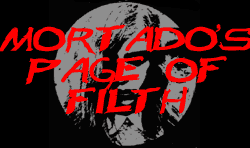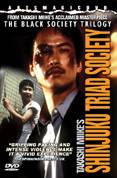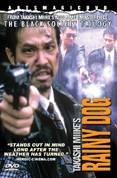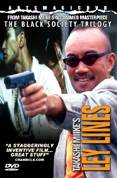
 |
|
|
Movie
Reviews - Forums of Filth
- Directors
- Movie Pages
- Eyeballs
- Gravemusic - Anna
Falchi - Links
|
|
|
Having
problems viewing images on our site? Click
here!
|
|



Whenever an Asian involved in cinema begins to get popular in America, various video companies frantically begin releasing his or her prior movies. In the instance of Takashi Miike, video companies must be rejoicing, as the man has made 16 films per week since the early 90s so has made approximately 8,000 films. ArtsMagic DVD have dipped into Miike's back catalog and released the Black Society Trilogy. The films aren't direct sequels to one another, but rather are linked because of similar thematic elements like alienation, underworlds, prostitutes, and Japanese guys.
The first in the series, Shinjuku Triad Society, was Miike's first theatrically released feature, and is reportedly the point where Miike's skill as a filmmaker improved to the extent of making him noteworthy. The film is kind of a nasty take on John Woo's A Better Tomorrow, revolving around two brothers on opposite sides of the thin blue line. And in Shinjuku Triad Society, that line is VERY thin.
The story opens with a narrator claiming it's a "love story," but the film mostly focuses on the two brothers, not the "lovers." The brothers are the sons of Chinese immigrants, and are dealing with trying to find a place they feel they belong in Japan. The older brother, the cop, struggles to reunite his fractured family, but his brother's involvement with an up and coming gang is making that very difficult for him.
Shinjuku Triad Society features brutal violence, some of it implied but still extreme. Aside from a chambara-esque gushing of blood from a knife wound, the violence is played harshly, with perhaps the most wince-inducing scene being the guy getting the There's Something About Mary zipper treatment. There's also an abundance of homosexuality on display, and the sexuality often mingles with the violence. There are TWO anal rapes (though one is hetero). Both have the odd effect of becoming like an investigation conducted by Shintarô Katsu's Razor character, with the victims liking it and then becoming willing to help the rapers.
Even with all the excesses on display, the film is a bit slow. It's not necessarily dull, though, and doesn't feel padded like some of Miike's other movies. Shinjuku Triad Society isn't Miike's best, but I found it more interesting and entertaining than some of his others
Continuing with the trilogy's theme of fevered revisions of other films is Rainy Dog, which bares some similarities to Luc Besson's Leon. The film also reminded me of Akira Kurosawa's Stray Dog in look and tone as both movies have lead characters searching for a way out of their current situation. But maybe it's just because both movies have "dog" in the title and I'm stretching to find a reason why I linked the two films.
Anyway, Rainy Dog is about a Japanese immigrant trying to get by in Taiwan. He can't return to Japan because of a gang issue, so is stuck trying to exist on the fringe of Taiwanese society. His work as a hitman allows him to keep interaction with others to a minimum, but another Japanese immigrant is tracking him, and what the other Japanese guy wants isn't quite clear. The hitman seems to be getting by, but then an ex-girlfriend, or one-night-stand, leaves him with a mute child she claims is his. The hitman continues on in his profession, with the child now following along.
The film's similarities to Leon are acknowledged on screen via a variation of the memorable scene of Jean Reno and Nathalie Portman walking down the street side by side, but the movies' differences are also shown, because in Rainy Dog, the "father" is leaving the child behind.
The hitman also has some obvious similarities to two characters played by that icon of cool, Chow Yun-Fat, but Miike's hitman shows fear, so he's humanized in a different way then Mr. Chow's popular Mark and Ah Jong characters from A Better Tomorrow and The Killer, respectively. Besides, Miike's hitman is way cooler because he likes that superest of turtles, GAMERA!
I liked Rainy Dog the best out of the three films. It's got better pacing than Shinjuku Triad Society, and more plot than Ley Lines. By this point, Miike's use of imagery is quite solid, and his interesting staging of scenes has fully come into play. I must confess I don't like the covering of genetalia by scratching the film stock (that also appears in the next film in the trilogy) because it pulls me out of the movie, but there are some other FX that are very eye pleasing.
Be warned if you're just looking for a film to help brush up your Japanese, Rainy Dog, being set in Taiwan, has very little dialog that is actually in that language.
Finishing off the trilogy is Ley Lines, which once again focuses on race as a huge alienation factor. Ley Lines is a bit darker in tone than Rainy Dog, but not as harsh as Shinjuku Triad Society. Ley Lines examines the underside of Japanese society, brilliantly showing it juxtaposed with everyday life. This is best demonstrated in a scene where a seemingly "normal" businessman quickly reveals he's into nipple piercing and has an alcohol to vagaina fetish.
In the film, three friends move to Tokyo, but end up ripped off by a hooker. The three end up dealing toluene, two of them prone to having the occasional emotional outburst, particularly when they encounter the hooker again. She gets away, but the calmer member of the trio eventually befriends her, then all of them seek to escape Japan as a group.
The film is a bit slow, but is generally interesting. However, the movie didn't work as well for me as Rainy Dog. Miike's staging and direction are excellent, but they don't cover the fact that the story is rather simple, and not a whole lot happens. Style doesn't completely win over content this time, but despite this the film is genuinely intriguing and engrossing.
Arts Magic DVD have released all three films of the trilogy in nice collector's
editions. All three films are presented at approximately 1.85:1 in 16:9 animorphic
prints. The prints could use some sharpening, and do get better with each subsequent
film, but none of the films look as good as the Chimera releases of other Miike
films. The subs are on the matte, but remain legible throughout each of the
films. All three discs include trailers, bios and filmographies, commentaries,
artwork, and interviews. The "artwork" is just the covers and synopsis
of the films in the trilogy, so isn't of much use if you've got all three of
the separate discs, but I guess might be of value if you have the box set and
are incredibly anal about having everything pertaining to the releases. The
interviews are lengthy talks split up between the discs, so each DVD contains
the next installment. There are two separate interviews with Miike on each DVD,
so in total the viewer gets nearly 100 minutes worth of interviews with Miike
about the three films. Each disc also comes with a section of an interview with
editor Yasushi Shimamura.
The best extra to each film is the commentary tracks provided by Tom Mes, author of Agitator: The Cinema of Takashi Miike. Tom is from Holland, but speaks perfect English and is VERY clear. Don't be fooled by any whiny babies complaining about accents, the guy speaks better English than I do and has better diction, too. Along with talking clearly, Mes also provides tons of information and cultural depth. Throughout the series he talks about the background of the trilogy and the themes that link them. He delves into symbolism, discusses the humanizing of characters that Miike is a master of, and characters' heritage driven motivations. Mes adds plentiful cultural layers to each film, giving insight on elements that most normal viewers would not pick up on. Mes does a LOT of explaining, but most if it expands on one's understanding of the films; it's not just him prattling out annoying synopses. Mes has a very good grasp of how to balance plot explanation with explanation of symbolism and meaning, never giving unnecessary amounts of either. My "complaints" about the commentaries are few. One is that he denies that you see the girl in the beginning of Shinjuku Triad Society struck by a chair. I think that you see initial contact, it's just tough to tell because there's a chair in the way. That's a mere matter for debate, but I truly didn't like that he gave away the endings to a few other Miike films in one commentary. It's safe to assume the viewer has seen the film the commentary is for, but I hadn't seen some of the other films mentioned, so that will probably spoil their resolution for me. But even that is forgivable because the man talks about...GAMERA! That's right! GAMERA! Of course, he doesn't talk enough about GAMERA, but, really, who could?
Anyway, the commentaries make each of these DVDs a very worthwhile
addition to any collection, even if someone doesn't necessarily like the films
themselves. While each of the films is at least worth seeing, and required viewing
for any Miike fan, it was the commentaries that really sold me on this collection.
More info from the DVD publisher: http://www.artsmagicdvd.com/blacksocietytrilogy/
-Devon Bertsch